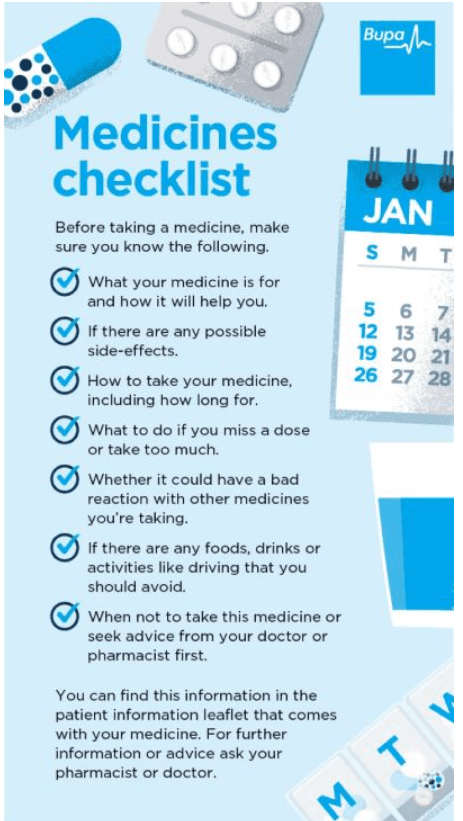Statins
Statins are medicines that lower the amount of cholesterol in your blood.

Uses of statins
Your doctor may recommend that you take statins if you:
- have already got, or have had a form of cardiovascular disease (CVD)
- are at an increased risk of developing CVD
CVD is the name for a number of conditions and diseases that affect your heart and blood vessels, which include coronary heart disease, angina, heart attacks and stroke. These are caused by the narrowing of your arteries (atherosclerosis) which is linked to having high cholesterol.
If you have a history of CVD
If you have the following health conditions, statins can help to prevent them from getting worse or from happening again.
- A heart attack or a stroke.
- Peripheral arterial disease – a disease that causes your arteries to narrow.
- A transient ischaemic attack (TIA, a ‘mini stroke’).
- Angina.
If you're at risk of developing CVD
Statins can also help stop CVD from developing if you don’t currently have cardiovascular problems, but are at risk of getting them.
Your doctor can assess your risk of CVD by asking you a series of questions and doing some health checks. If your doctor thinks there’s at least a one in 10 chance of you having a heart attack or stroke over the next 10 years, they may recommend statins.
Your doctor may also advise you to take statins to prevent CVD if you have:
- or type 2 diabetes
- long-term kidney disease
- a genetic condition called familial hypercholesterolaemia (FH)
Usually, before your doctor suggests you take statins, they’ll encourage you to adapt your lifestyle to naturally lower your cholesterol level.
Statins aren’t suitable for everyone. Make sure your doctor knows about any other health conditions you have, or medicines you take. And if you're pregnant, breastfeeding or trying for a baby, tell your doctor so they can take this into account, as you won’t usually be able to take statins.
If your doctor recommends you take statins, it’s your decision whether or not you do. Ask your doctor to go through the pros and cons of statins and to discuss any alternatives to statins with you.
Making a decision
In general, experts believe that the benefits of taking statins outweigh the harms. If you’ve already got CVD (for instance, you’ve had a heart attack), you’ll get the greatest benefits from statins.
How statins work
Statins work by lowering the amount of cholesterol in your blood.
Cholesterol is a type of fat made in your liver. It does a lot of important jobs that keep you healthy. But if you have too much ‘bad’ cholesterol (low-density lipoprotein or LDL) in your blood, it can cause atherosclerosis. This is when fatty deposits build up on the walls of your arteries.
Statins reduce the amount of LDL cholesterol in your blood by slowing down the production of cholesterol by your liver. By reducing your cholesterol, statins can help to reduce your risk of having cardiovascular disease (CVD) events, such as a heart attack or stroke.
Besides lowering cholesterol, statins work in other ways that may help to prevent CVD and other conditions. For instance, it’s thought that statins may have anti-inflammatory effects and may help strengthen and repair the walls of your blood vessels.
Types of statins
There are five types of statin available in the market
- atorvastatin (eg Lipitor)
- simvastatin (eg Zocor)
- pravastatin
- fluvastatin (eg Lescol and Dorisin)
- rosuvastatin (eg Crestor)
Your doctor will recommend the statin and the dose that’s best for you. This will depend on your medical. history, and how much your cholesterol level needs to come down. Some statins lower blood cholesterol more than others. Most people are first prescribed atorvastatin.
You can buy some low-dose statins from a pharmacy without a prescription from a doctor. Your pharmacist doctor will talk to you about whether these are suitable for you. If you’re at risk of heart disease, your doctor may prescribe a higher-dose statin for you.
Taking statins
Statins come as tablets or capsules, which you take once a day, and at the same time every day. You can take atorvastatin and rosuvastatin at any time of the day, but you need to take the other statins in the evening. If you forget to take a tablet, wait until your next dose. If you take too much, contact your doctor or hospital for advice.
It’s important to carefully read the patient information which comes with your medicine. And if you have any questions about how to take your medicine, ask your doctor.
Statins are a long-term treatment, which means you’ll need to continue to take them to get the benefits. You’ll need a check-up with your doctor after you’ve been taking a statin for three months, then again after a year. You may need blood tests, and your doctor may need to adjust the dose or type of statin you take.
Interactions of statins
Statins can react with some other medicines and products. Let your doctor know if you take any other medicines, and before you take any other medicines or supplements with a statin.
Grapefruit juice can interact with some statins and cause problems. You may need to limit how much you drink, or stop drinking it altogether.
Side-effcts of statins
You may have heard a lot about the possible side-effects of statins. All medicines can cause some side-effects, but most people who take statins have no problems.
We list some of the side-effects of statins here, but please also read the information that comes with your medicine carefully.
Common side-effects
Common side-effects of statins include:
- a blocked nose
- a sore throat
- nose bleeds
- headache
- nausea (feeling sick), diarrhoea, constipation,indigestion
- mild pain in your muscles, joints, neck and back
- a lack of energy
- dizziness
Speak to your doctor if problems like these don’t settle.
Uncommon side-effects
Less common side-effects of statins include:
- weight loss or weight gain
- problems with sleep, such as nightmares or insomnia
- blurred vision
- changes in sensation – for example, you might have numbness in your fingers or changes in taste sensation
- a rash on your skin
- tired muscles
Give your new medicine a chance, but if you do feel that the statins are giving you side-effects, speak to your doctor. They may suggest that you stop for a short while to see if your symptoms settle. Depending on what happens, your doctor may then reduce the dose of your current statin or switch to a different type of statin.
Serious side-effects and what to do
Statins can sometimes cause more serious problems but this is rare. If you get any of the reactions below, stop taking the statin and contact your doctor immediately.
- An allergic reaction that causes your face, tongue and throat to swell and makes it hard to breathe.
- Blistering and swelling to your skin; this may be to your mouth, eyes or genitals and you may also have a fever. Or you may have skin reactions that may cause your skin to look red.
- Pain, weakness and tenderness in your muscles with a high temperature and feeling generally unwell; this might be a sign of muscle damage.
Medicines checklist
Our handy medicines checklist can help you see what to check for before you take a medicine.

Frequently asked questions
The information and/or article is solely the contribution of Bupa, (hereinafter referred to as “Bupa UK”) a United Kingdom (UK) based healthcare services expert and is based on their experiences and medical practices prevalent in UK. All the efforts to ensure accuracy and relevance of the content is undertaken by Bupa UK. The content of the article should not be construed as a statement of law or used for any legal purpsoe or otherwise. Niva Bupa Health Insurance Company Limited (formerly known as Max Bupa Health Insurance Company Limited) (hereinafter referred to as “the Company”) hereby expressly disown and repudiated any claims (including but not limited to any third party claims or liability, of any nature, whatsoever) in relation to the accuracy, completeness, usefulness and real-time of any information and contents available in this article, and against any intended purposes (of any kind whatsoever) by use thereof, by the user/s (whether used by user/s directly or indirectly). Users are advised to obtain appropriate professional advice and/or medical opinion, before acting on the information provided, from time to time, in the article(s).